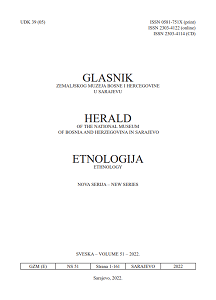Dvije pjesme iz duhovnog naslijeđa Srebrenice
Two poems from spiritual heritage of Srebrenica
Author(s): Nirha EfendićSubject(s): Museology & Heritage Studies, Customs / Folklore, Music, Cultural Anthropology / Ethnology
Published by: Zemaljski muzej Bosne i Hercegovine
Keywords: Srebrenica; remembrance; tradition; intangible cultural heritage; epic song; ballad;
Summary/Abstract: In 2008 and 2009, the expert team of ethnologists of the National Museum of Bosnia and Herzegovina conducted a series of ethnographic studies of certain settlements in the vicinity of Sarajevo, which were built and populated by persons exiled from Srebrenica. The main task of the team was to record the changes in the way of life of the people of Srebrenica after the persecution in 1995. As a member of the research team of the Ethnology Department of the National Museum of Bosnia and Herzegovina, I was given the task of recording oral poems that were mainly remembered and preserved by women. The results of these notes were published in two series: the first and earliest ones were published in 2015 in the collection entitled ‘ Žene nositeljice narodne muzičke prakse u Bosni Hercegovini’ (Women bearers of folk music practice in Bosnia and Herzegovina) and published by the Sarajevo Music Academy, and the second part was published in 2022 in the journal ‘Društvene i humanističke studije’ which is published by the Tuzla. This paper will focus on a part of the recorded material that arrived at the National Museum in the meantime, at the moment when the material obtained from the returnees in Srebrenica was being shaped into scientific work. The material obtained on that occasion was not recorded in Srebrenica, but thematically it belongs to the Srebrenica canon, because it is dedicated to the tragic events that took place in this town. It is an epic song that was created in response to the genocide committed in Srebrenica in July 1995. The creator of the song and gusle player is Željko Šimić from Grud. The analysis of the material brought from Grude will be compared with the analysis of a segment of the material brought from Srebrenica. The recording of the singing accompanied by gusle was given to me by professor Jasmina Talam, who recorded Željko in 2017 in Grude. The work relies on interpretative and analytical methods.
Journal: Glasnik Zemaljskog muzeja Bosne i Hercegovine u Sarajevu: Etnologija
- Issue Year: 2022
- Issue No: 51
- Page Range: 13-26
- Page Count: 14
- Language: Bosnian

